2019英语四级作文热点话题及范文:专才与全才
- 格式:docx
- 大小:37.20 KB
- 文档页数:2
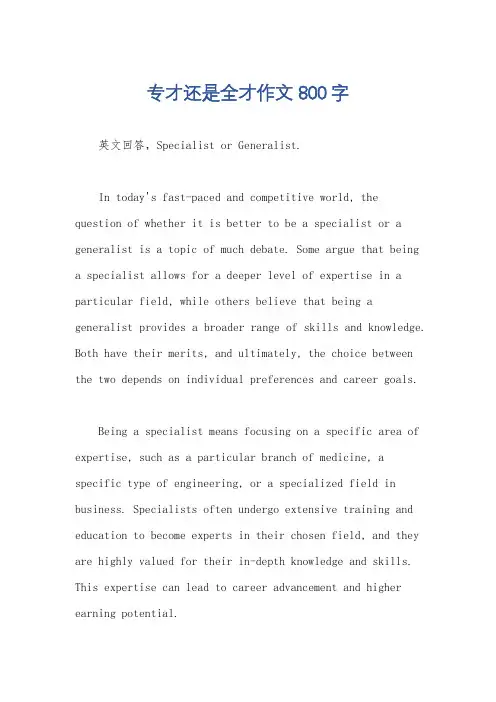
专才还是全才作文800字英文回答,Specialist or Generalist.In today's fast-paced and competitive world, the question of whether it is better to be a specialist or a generalist is a topic of much debate. Some argue that being a specialist allows for a deeper level of expertise in a particular field, while others believe that being a generalist provides a broader range of skills and knowledge. Both have their merits, and ultimately, the choice between the two depends on individual preferences and career goals.Being a specialist means focusing on a specific area of expertise, such as a particular branch of medicine, a specific type of engineering, or a specialized field in business. Specialists often undergo extensive training and education to become experts in their chosen field, and they are highly valued for their in-depth knowledge and skills. This expertise can lead to career advancement and higher earning potential.On the other hand, being a generalist means having a broad range of skills and knowledge across multiple disciplines. Generalists are adaptable and versatile, able to take on various roles and tasks. They may not have the same level of expertise as specialists, but they can offer diverse perspectives and solutions to complex problems. Generalists are often sought after for their ability to bridge different areas of expertise and bring a well-rounded approach to their work.中文回答,专才还是全才。
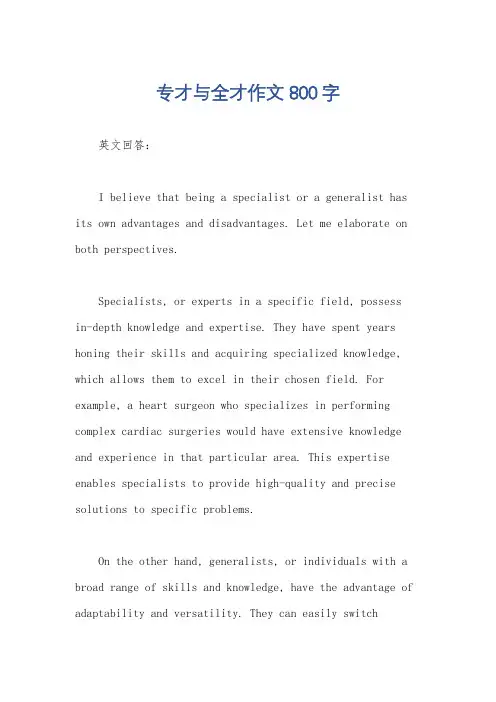
专才与全才作文800字英文回答:I believe that being a specialist or a generalist has its own advantages and disadvantages. Let me elaborate on both perspectives.Specialists, or experts in a specific field, possess in-depth knowledge and expertise. They have spent years honing their skills and acquiring specialized knowledge, which allows them to excel in their chosen field. For example, a heart surgeon who specializes in performing complex cardiac surgeries would have extensive knowledge and experience in that particular area. This expertise enables specialists to provide high-quality and precise solutions to specific problems.On the other hand, generalists, or individuals with a broad range of skills and knowledge, have the advantage of adaptability and versatility. They can easily switchbetween different tasks and handle various challenges. Generalists are often considered to be well-rounded individuals who can contribute effectively in multiple areas. For instance, a generalist manager who has a good understanding of different departments within a company can effectively coordinate and communicate between teams, ensuring smooth operations.In the professional world, the choice between being a specialist or a generalist often depends on the nature of the job and the individual's career goals. Some professions require deep expertise in a specific area, such as research scientists or engineers. In these fields, being aspecialist is crucial for making groundbreaking discoveries or developing innovative solutions. However, in rapidly changing industries or entrepreneurial ventures, having a generalist mindset can be advantageous. Generalists can quickly adapt to new situations, learn new skills, and take on diverse responsibilities.It is important to note that the distinction between specialists and generalists is not always clear-cut. Manyprofessionals possess a combination of specialized knowledge and a broad skill set. These individuals are known as "T-shaped" professionals, as they have deep expertise in one area (the vertical bar of the "T") and a broad understanding of other domains (the horizontal bar of the "T"). This combination allows them to bring a unique perspective to problem-solving and collaboration.In conclusion, both specialists and generalists have their own strengths and weaknesses. The choice between the two depends on the specific requirements of the job and the individual's career goals. It is also worth consideringthat the line between specialists and generalists is often blurred, and possessing a combination of both skills can be highly valuable in today's dynamic and ever-changing professional landscape.中文回答:我相信成为专家或全才都有各自的优势和劣势。

专才和通才英文作文I believe that everyone has their own unique talents and abilities. Some people are "specialists" who excel in a specific area, while others are "generalists" who have a wide range of skills and knowledge.Specialists are like experts in their field. They have deep knowledge and expertise in a specific area, and they are able to solve complex problems and make significant contributions in their specialized field. They are the go-to people when you need in-depth knowledge and specialized skills.On the other hand, generalists are like jacks of all trades. They have a broad range of skills and knowledge, and they are able to adapt to different situations and learn new things quickly. They are versatile and flexible, and they can handle a variety of tasks and challenges with ease.Specialists may be highly sought after for their expertise, but generalists also have their own advantages. In today's fast-paced and ever-changing world, the ability to adapt and learn new skills is becoming increasingly important. Generalists are able to see the big picture and make connections between different fields, which can lead to innovative solutions and breakthroughs.While specialists may be more focused and in-depth in their knowledge, generalists are able to bring a fresh perspective and think outside the box. They are able to see the connections between different fields and come up with creative solutions to complex problems.In conclusion, both specialists and generalists have their own unique strengths and abilities. It's important to recognize and appreciate the value that each brings to the table. Whether you are a specialist or a generalist, embracing your own talents and abilities is key to success.。
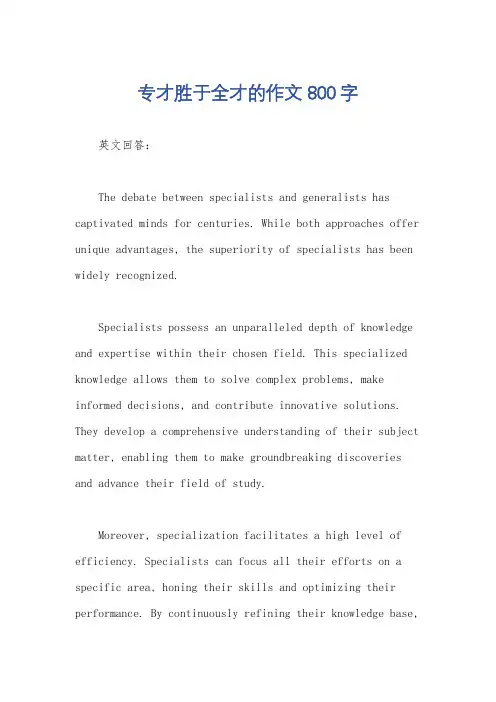
专才胜于全才的作文800字英文回答:The debate between specialists and generalists has captivated minds for centuries. While both approaches offer unique advantages, the superiority of specialists has been widely recognized.Specialists possess an unparalleled depth of knowledge and expertise within their chosen field. This specialized knowledge allows them to solve complex problems, make informed decisions, and contribute innovative solutions. They develop a comprehensive understanding of their subject matter, enabling them to make groundbreaking discoveries and advance their field of study.Moreover, specialization facilitates a high level of efficiency. Specialists can focus all their efforts on a specific area, honing their skills and optimizing their performance. By continuously refining their knowledge base,they become experts in their niche and can produce exceptional outcomes.In contrast, generalists have a broader knowledge base that encompasses multiple disciplines. While they may have a wider perspective, their knowledge in each area is often superficial. This may limit their ability to solve complex problems, as they lack the specialized insights necessary.Furthermore, generalists may face challenges in keeping up with the rapid pace of technological and scientific advancements. The ever-evolving nature of knowledge requires constant learning and specialization, which may be difficult for generalists who spread their efforts across multiple fields.While generalists may be better suited for roles that require a broad understanding of various disciplines, in most cases, the advantages of specialization outweigh those of generalization. Specialists possess the expertise, efficiency, and depth of knowledge necessary to drive innovation, solve complex problems, and make significantcontributions to their field.中文回答:在专才与通才的争论中,专才的优势早已广受认可。
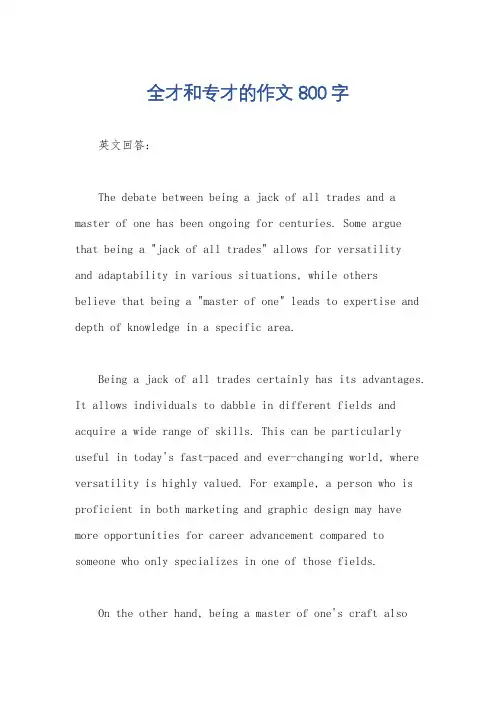
全才和专才的作文800字英文回答:The debate between being a jack of all trades and a master of one has been ongoing for centuries. Some arguethat being a "jack of all trades" allows for versatilityand adaptability in various situations, while othersbelieve that being a "master of one" leads to expertise and depth of knowledge in a specific area.Being a jack of all trades certainly has its advantages. It allows individuals to dabble in different fields and acquire a wide range of skills. This can be particularly useful in today's fast-paced and ever-changing world, where versatility is highly valued. For example, a person who is proficient in both marketing and graphic design may have more opportunities for career advancement compared to someone who only specializes in one of those fields.On the other hand, being a master of one's craft alsohas its merits. By focusing on a specific skill or area of expertise, individuals can develop a deep understanding and mastery of that particular subject. This can lead to greater job satisfaction, as well as potentially higher levels of success and recognition within that field. For instance, a renowned neurosurgeon who has dedicated years to mastering their craft is likely to be highly soughtafter and respected in the medical community.Ultimately, the choice between being a jack of all trades and a master of one depends on individual goals, interests, and circumstances. Some people thrive in constantly learning and adapting to new challenges, while others find fulfillment in honing their skills toperfection within a specific domain.中文回答:在成为全才和专才之间的辩论已经持续了数个世纪。
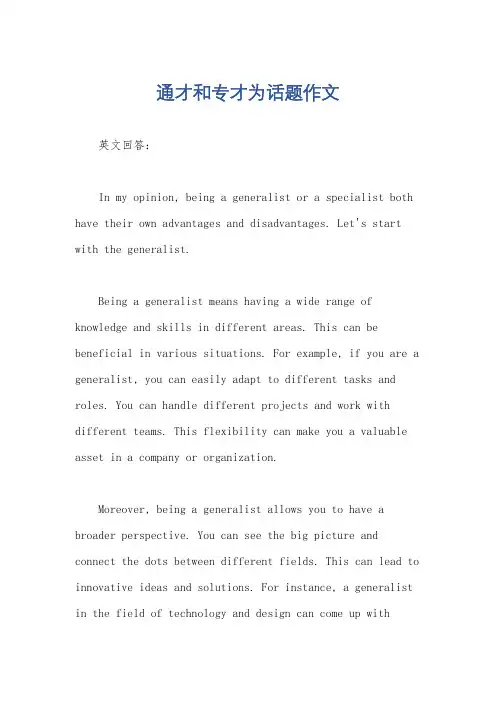
通才和专才为话题作文英文回答:In my opinion, being a generalist or a specialist both have their own advantages and disadvantages. Let's start with the generalist.Being a generalist means having a wide range of knowledge and skills in different areas. This can be beneficial in various situations. For example, if you are a generalist, you can easily adapt to different tasks and roles. You can handle different projects and work with different teams. This flexibility can make you a valuable asset in a company or organization.Moreover, being a generalist allows you to have a broader perspective. You can see the big picture and connect the dots between different fields. This can lead to innovative ideas and solutions. For instance, a generalist in the field of technology and design can come up withcreative solutions by combining different concepts and approaches.On the other hand, being a specialist also has its own advantages. A specialist focuses on a specific field or area and becomes an expert in it. This expertise can lead to high-quality work and deep understanding of the subject matter. For example, a specialist in medicine can provide accurate diagnoses and effective treatments for specific conditions.Furthermore, being a specialist can lead to career advancement and higher earning potential. Companies and organizations often value specialists who have in-depth knowledge and skills in a particular field. They arewilling to pay a premium for their expertise. For instance, a specialist in finance can command a higher salary compared to a generalist in the same industry.中文回答:在我看来,成为通才或专才都有各自的优势和劣势。
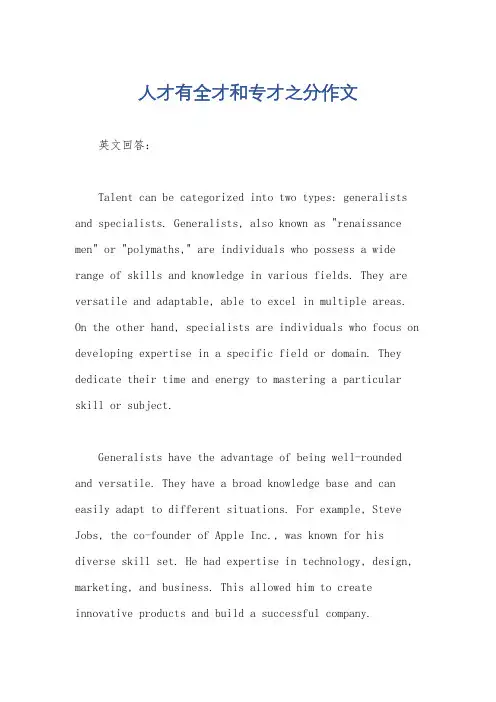
人才有全才和专才之分作文英文回答:Talent can be categorized into two types: generalists and specialists. Generalists, also known as "renaissance men" or "polymaths," are individuals who possess a wide range of skills and knowledge in various fields. They are versatile and adaptable, able to excel in multiple areas. On the other hand, specialists are individuals who focus on developing expertise in a specific field or domain. They dedicate their time and energy to mastering a particular skill or subject.Generalists have the advantage of being well-rounded and versatile. They have a broad knowledge base and can easily adapt to different situations. For example, Steve Jobs, the co-founder of Apple Inc., was known for his diverse skill set. He had expertise in technology, design, marketing, and business. This allowed him to create innovative products and build a successful company.Specialists, on the other hand, possess deep knowledge and expertise in a specific area. They are often sought after for their specialized skills. For instance, Serena Williams is a tennis specialist who has dedicated her life to mastering the sport. Her focus and determination have made her one of the greatest tennis players of all time.Both generalists and specialists have their own strengths and weaknesses. Generalists may lack the depth of knowledge that specialists possess, but they make up for it with their versatility. They can easily adapt to new challenges and learn new skills. Specialists, on the other hand, may struggle outside of their specific domain, but they excel in their chosen field.中文回答:人才可以分为全才和专才两种类型。
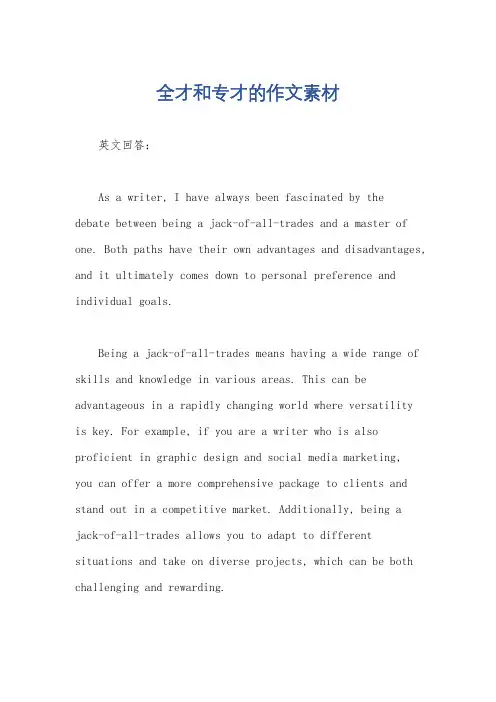
全才和专才的作文素材英文回答:As a writer, I have always been fascinated by thedebate between being a jack-of-all-trades and a master of one. Both paths have their own advantages and disadvantages, and it ultimately comes down to personal preference and individual goals.Being a jack-of-all-trades means having a wide range of skills and knowledge in various areas. This can be advantageous in a rapidly changing world where versatilityis key. For example, if you are a writer who is also proficient in graphic design and social media marketing,you can offer a more comprehensive package to clients and stand out in a competitive market. Additionally, being ajack-of-all-trades allows you to adapt to different situations and take on diverse projects, which can be both challenging and rewarding.On the other hand, being a master of one means focusing all your energy and resources on becoming the best in a specific field. This can lead to deeper expertise, recognition, and possibly higher pay in that particular area. For instance, if you are a master of storytelling,you may be sought after for your unique voice and style, leading to more opportunities for book deals or collaborations with top publishers. However, this specialization may limit your options and make it harder to switch to a different career path in the future.中文回答:作为一名作家,我一直对成为全才和专才之间的争论感到着迷。
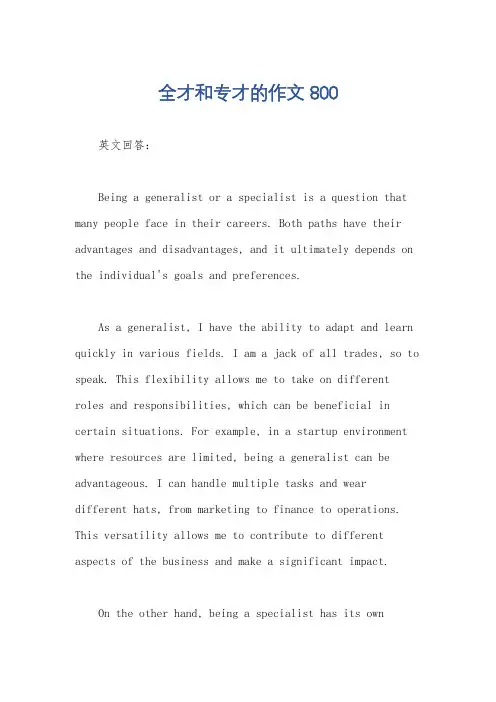
全才和专才的作文800英文回答:Being a generalist or a specialist is a question that many people face in their careers. Both paths have their advantages and disadvantages, and it ultimately depends on the individual's goals and preferences.As a generalist, I have the ability to adapt and learn quickly in various fields. I am a jack of all trades, so to speak. This flexibility allows me to take on different roles and responsibilities, which can be beneficial in certain situations. For example, in a startup environment where resources are limited, being a generalist can be advantageous. I can handle multiple tasks and weardifferent hats, from marketing to finance to operations. This versatility allows me to contribute to different aspects of the business and make a significant impact.On the other hand, being a specialist has its ownmerits. Specialists possess deep knowledge and expertise in a specific field. They are the go-to person for aparticular subject matter. This level of specialization can lead to career growth and recognition. For instance, a doctor who specializes in a specific medical field may have more opportunities for research and advancements in their career. They can become renowned experts in their field and make significant contributions to their industry.中文回答:作为一个全才或者专才是许多人在职业生涯中面临的问题。
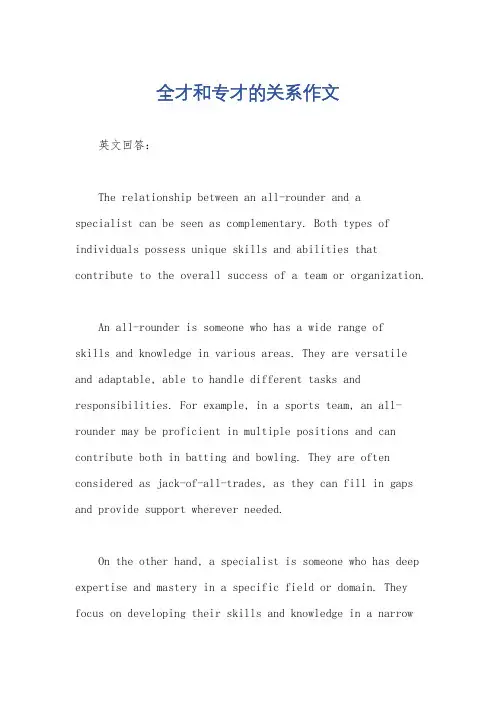
全才和专才的关系作文英文回答:The relationship between an all-rounder and aspecialist can be seen as complementary. Both types of individuals possess unique skills and abilities that contribute to the overall success of a team or organization.An all-rounder is someone who has a wide range ofskills and knowledge in various areas. They are versatile and adaptable, able to handle different tasks and responsibilities. For example, in a sports team, an all-rounder may be proficient in multiple positions and can contribute both in batting and bowling. They are often considered as jack-of-all-trades, as they can fill in gaps and provide support wherever needed.On the other hand, a specialist is someone who has deep expertise and mastery in a specific field or domain. They focus on developing their skills and knowledge in a narrowarea, becoming highly proficient in that particular field. For instance, a neurosurgeon is a specialist who has dedicated years to studying and practicing surgery specifically related to the nervous system. Their expertise allows them to handle complex cases and provide specialized care to patients.While an all-rounder brings versatility and flexibility to a team, a specialist brings depth and expertise. Both are valuable and necessary in different contexts.中文回答:全才和专才之间的关系可以看作是相辅相成的。
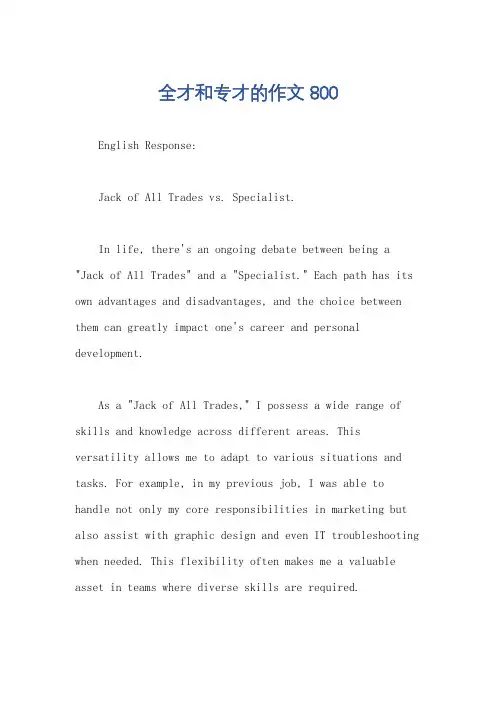
全才和专才的作文800English Response:Jack of All Trades vs. Specialist.In life, there's an ongoing debate between being a "Jack of All Trades" and a "Specialist." Each path has its own advantages and disadvantages, and the choice between them can greatly impact one's career and personal development.As a "Jack of All Trades," I possess a wide range of skills and knowledge across different areas. Thisversatility allows me to adapt to various situations and tasks. For example, in my previous job, I was able to handle not only my core responsibilities in marketing but also assist with graphic design and even IT troubleshooting when needed. This flexibility often makes me a valuable asset in teams where diverse skills are required.However, being a "Jack of All Trades" also has its downsides. While I may have surface-level knowledge in many areas, I might lack the in-depth expertise that aspecialist possesses. This can sometimes lead to challenges in competing with specialists in specific fields. For instance, when it comes to complex marketing analytics, I might not have the same depth of understanding as someone who specializes solely in that area.On the other hand, a "Specialist" focuses deeply on a particular field or skill. This intense concentration often results in a high level of expertise and proficiency. For instance, a neurosurgeon spends years honing their skills to become a master in their field. This specialization can lead to recognition, higher pay, and a sense of accomplishment.Yet, being a specialist also comes with limitations. There's a risk of becoming too narrow-focused, potentially missing out on opportunities outside of one's expertise. Additionally, if the demand for that particular skill diminishes, the specialist might face challenges intransitioning to a different career path.中文回答:全才 vs. 专才。
人有全才和专才之分作文英文回答:People are often categorized into two types: those who are versatile and those who are specialized. Each type has its own advantages and disadvantages, and it is important to understand the differences between the two.Versatile individuals, also known as generalists or polymaths, possess a wide range of skills and knowledge in various fields. They excel in multiple areas and are capable of adapting to different situations. For example, a versatile person may be skilled in both writing and public speaking, allowing them to effectively communicate their ideas to different audiences. They are often quick learners and can easily acquire new skills.On the other hand, specialized individuals, also known as specialists or experts, focus their efforts on aspecific area of expertise. They dedicate their time andenergy to mastering a particular skill or subject. For instance, a specialized doctor may specialize in cardiology and become an expert in diagnosing and treating heart conditions. Specialists are often highly sought after for their expertise and can provide valuable insights and solutions in their respective fields.Both versatile and specialized individuals have their own unique contributions to society. Versatile individuals bring diversity and flexibility to a team or organization. They can handle a wide range of tasks and are ofteneffective problem solvers. They are adaptable and caneasily switch between different roles and responsibilities. On the other hand, specialized individuals bring depth and expertise to a specific field. They have a deep understanding of their area of specialization and can provide in-depth analysis and solutions to complex problems.However, there are also limitations to each type. Versatile individuals may lack the depth of knowledge and expertise that specialists possess. They may not be able to provide specialized solutions to complex problems. On theother hand, specialists may struggle when faced with tasks or challenges outside their area of expertise. They may have difficulty adapting to new situations or acquiring new skills.In conclusion, both versatile and specialized individuals have their own strengths and weaknesses. It is important to recognize and appreciate the contributions of both types. In some situations, a versatile individual may be more suitable, while in others, a specialized individual may be the better choice. Ultimately, the key is to find a balance between the two and leverage the strengths of each type to achieve the best outcomes.中文回答:人们通常被分为两种类型,全才和专才。
全才和专才的作文800字英文回答:The debate between being an all-rounder (someone who is skilled in many areas) and a specialist (someone who is highly skilled in one specific area) has been ongoing for quite some time. Both have their own merits and drawbacks, and it ultimately depends on the individual's goals and preferences.Being a jack-of-all-trades certainly has its advantages. For example, if you are a versatile person who can excel in multiple fields, you have a wider range of opportunities available to you. You can adapt to different situations and take on various roles, which can be beneficial in a fast-paced and ever-changing world. Moreover, being knowledgeable in different areas allows you to have a broader understanding of the world and can make you a more well-rounded person.On the other hand, being a specialist has its own set of advantages. By focusing on one specific area, you can develop a deep level of expertise and mastery. This can lead to greater recognition and opportunities within that particular field. Specialists are often sought after for their specialized knowledge and skills, and they can become leaders and experts in their respective fields.However, there are also drawbacks to both approaches. All-rounders may lack the depth of knowledge and expertise that specialists possess. They may be considered as "jacks of all trades, but masters of none." On the other hand, specialists may face challenges if their field becomes obsolete or if there is a lack of demand for their specific skills. They may also miss out on opportunities in other areas due to their narrow focus.In my opinion, it is important to strike a balance between being a generalist and a specialist. While it is beneficial to have a broad range of skills and knowledge, it is also crucial to have a deep level of expertise in at least one area. This allows you to have a strong foundationwhile still being adaptable and versatile.中文回答:关于成为全才(在许多领域都有才能的人)和专才(在某个特定领域非常擅长的人)之间的争论已经进行了相当长的时间。
专才是基础,全才是突破话题作文英文回答:Specialization and versatility are two distinct approaches to career development. Specialization requires the focused pursuit of expertise in a particular field, while versatility involves developing a wide range ofskills and knowledge. Both approaches have their merits, but the optimal choice depends on individual circumstances and aspirations.Specialization offers several advantages. It allows individuals to develop a deep understanding of a particular subject matter, which can make them highly sought after by employers looking for experts in specific areas. Specialization also facilitates the accumulation of specialized knowledge and skills, which can lead to higher earning potential.However, specialization can also have drawbacks. It canlimit career options and make individuals less adaptable to changes in the job market. Furthermore, specialization can lead to a narrow and fragmented view of the world, as individuals become overly focused on their narrow area of expertise.Versatility, on the other hand, provides individuals with a broader range of skills and knowledge, which can make them more adaptable and resilient in the face of changing circumstances. Versatile individuals are able to take on a wider variety of tasks and responsibilities, which can make them more valuable to employers.One of the main advantages of versatility is that it allows individuals to pursue a wider range of career opportunities. Versatile individuals are not tied to a particular field and can easily transition betweendifferent industries or roles. This flexibility can provide greater job security and career longevity.However, versatility can also have its limitations. It can be difficult to develop the same level of expertise inmultiple areas as one would with specialization. Versatile individuals may also find it challenging to stand out from the crowd in a competitive job market.Ultimately, the choice between specialization and versatility depends on individual preferences and career goals. Those who value deep expertise and are willing to limit their career options may prefer to specialize. Those who prioritize flexibility and adaptability may benefit more from developing a wide range of skills and knowledge.中文回答:专才和全才,两种截然不同的职业发展道路。
人才有全才和专才,作文英文回答:In the realm of human capital, the debate between generalists and specialists has long been a topic of discussion. While both approaches have their own merits, the question of which is more advantageous depends on the specific context and requirements.Generalists, also known as "Renaissance individuals," possess a broad range of knowledge and skills across multiple disciplines. They can quickly adapt to changing circumstances, learn new disciplines, and connect diverse concepts. Generalists are often highly valued in leadership roles, where a wide perspective and the ability to synthesize information from different fields is crucial. They can also be effective communicators and bridge-builders between different teams or organizations.Specialists, on the other hand, focus on developingdeep expertise in a particular area or field. They possess a highly specialized knowledge base and can solve complex problems within their domain. Specialists are often indispensable in highly technical or scientific fields, where extensive training and experience are required. They can drive innovation and push the boundaries of knowledge within their chosen field.Both generalists and specialists have their own unique strengths and play important roles in society. Generalists provide versatility and adaptability, while specialists offer depth and expertise. The key to maximizing the potential of human capital lies in finding the right balance and combination of these two approaches.中文回答:人才既有通才,又有专才。
专才是全才的基础作文800字英文回答:Specialists are the foundation of generalists. This is because specialists have a deep understanding of aparticular area of knowledge or skill, which allows them to develop the expertise that generalists need to be able to work effectively in a variety of different areas.For example, a doctor is a specialist in the field of medicine. They have spent years studying the human body and learning how to diagnose and treat diseases. This expertise allows them to provide general medical care to patients, even if they do not have a specific specialization in the patient's particular condition.Similarly, a lawyer is a specialist in the field of law. They have spent years studying the legal system andlearning how to apply the law to real-world situations.This expertise allows them to provide legal advice toclients, even if they do not have a specific specialization in the client's particular legal issue.Generalists, on the other hand, have a broad understanding of a variety of different areas of knowledge or skill. This allows them to work effectively in a variety of different roles and situations. For example, a manager is a generalist who has a basic understanding of business, finance, human resources, and marketing. This allows them to oversee a team of specialists and make decisions that are in the best interests of the organization.Similarly, a teacher is a generalist who has a basic understanding of a variety of different subjects. This allows them to teach students a wide range of topics and help them to develop the skills they need to succeed in school and beyond.Without specialists, generalists would not be able to develop the expertise they need to be able to work effectively in a variety of different areas. Specialists provide the foundation of knowledge and skill thatgeneralists need to be able to succeed.中文回答:专才乃通才之基石。
专才和全才的作文素材英文回答:In my opinion, being a specialist or a generalist both have their own advantages and disadvantages. Let me elaborate on this.Specialists are experts in a specific field, which means they possess in-depth knowledge and skills in that particular area. They are highly focused and have a deep understanding of their subject matter. For example, a heart surgeon specializes in heart surgeries and has spent years perfecting their techniques. They are able to handle complex cases and provide the best possible care to their patients. This level of expertise can lead to great success and recognition in their field.On the other hand, generalists have a broader range of knowledge and skills across different areas. They are versatile and adaptable, able to handle various tasks andchallenges. Generalists are like jacks-of-all-trades, possessing a wide range of skills that can be applied to different situations. For instance, a general practitioner in medicine is knowledgeable in various areas of healthcare and can provide comprehensive care to patients. They may not have the same level of expertise as a specialist, but they are able to handle a wide range of medical issues.However, being a specialist or a generalist also hasits drawbacks. Specialists may become too focused on their specific field and lose sight of the bigger picture. They may struggle to adapt to new situations or handle tasks outside their area of expertise. On the other hand, generalists may lack the depth of knowledge and skills that specialists possess. They may not be able to provide the same level of specialized care or expertise in a specific field.To illustrate this, let's consider the field of technology. A specialist in artificial intelligence may be able to develop advanced algorithms and models for machine learning, but they may struggle to understand the broaderimplications of their work or how it can be applied in different industries. On the other hand, a generalist in technology may have a good understanding of various areas such as software development, networking, and cybersecurity, but they may not have the same level of expertise in anyone specific area.In conclusion, both specialists and generalists have their own strengths and weaknesses. Specialists excel in their specific field and possess deep expertise, while generalists have a broader range of knowledge and skills. The choice between being a specialist or a generalist ultimately depends on individual preferences, career goals, and the specific requirements of the job or field. It is important to recognize the value of both types of professionals and to find a balance between specialization and versatility.中文回答:在我看来,成为专才或全才都有各自的优势和劣势。
2019英语四级作文热点话题及范文:专才与全才下面是英语四级备考作文范文:“专才”与“全才”
Directions:For this part,you are allowed 30 minutes to write a short essay entitled To Become a Specialist or a Generalist?
1.有人认为一个学生应该努力成为一个“专才”。
2.不过其他人则认为学生应该成为“通才”才能在社会上立足。
3.你的看法是......
【英语四级作文范文】
When it comes to whether a studentshould become a specialist or a generalist, there is no complete agreement among people. Some people think that it is best for college students to focuson developing skills in one field to become a specialist. However, others maintain that a versatile generalist is more welcomed in the competitive jobmarket.
Those people who hold the former opinion believe that it is impossible to demand college students to become an all-round generalist within four years. In addition, with increasing elaboration ofsocial division, the specialists are in more urgent need. However, still others advocate the different opinion. They hold that college students should stretch themselves to as many fields as possible to adapt to the increasingly fierce competition. Besides, generalists are highly demanded in the information age.
Personally, I am in favor of the former opinion. I
don’t think it is advisable that college students equally
spend their time and energy on several fields. Besides, the development of high-techneeds specialists. Therefore, I think to be a specialist is the right choicefor most students.。